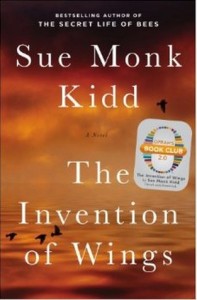 Thanks to everyone who read The Invention of Wings this month (which I introduced here). Here’s how it works: I’ll throw out a few topics for discussion, and you can write your responses about these topics (or others you’d like to discuss) in the comment section.
Thanks to everyone who read The Invention of Wings this month (which I introduced here). Here’s how it works: I’ll throw out a few topics for discussion, and you can write your responses about these topics (or others you’d like to discuss) in the comment section.
Discussion #1: Multiple perspectives
I liked the use of two narrators (Handful and Sarah). It gives us a perspective we wouldn’t have if we saw the story from only one character’s point of view. It also allows us to get inside their heads and see their real struggles—they feel like real people with complex personalities and challenges.
Did you relate to any of the characters? Did you have a favorite?
Discussion #2: Characters finding their voice
I appreciated the way the author wove in the theme of struggling to find one’s voice. Sarah literally fought to express herself despite her stutter, and she also strove to find her voice as a woman in an era that didn’t give her many outlets to do so. She tried to speak up through the platform of the law and the church, and eventually found her voice by joining the abolitionist movement.
Charlotte, too, struggled to find her voice as a slave and as a woman, and she ultimately found a way to express herself through the story quilt: “Mauma had sewed where she came from, who she was, what she loved, the things she’d suffered, and the things she hoped. She’d found a way to tell it.”
Have you ever struggled to find your voice? What helped you express yourself?
Discussion #3: Passive evil vs. active evil
One of the sobering realities portrayed in this book is that evil isn’t just perpetuated by those who actually inflict the cruelty (like the slave owners who beat the slaves). Evil also grows as a result of those who sit back and allow it to happen. It was heartbreaking to watch Sarah start out with childlike idealism, creating the manumission paper to free Handful, and then gradually become cynical as she grows older: “I was very good at despising slavery in the abstract, in the removed and anonymous masses, but in the concrete, intimate flesh of the girl beside me, I’d lost the ability to be repulsed by it. I’d grown comfortable with the particulars of evil. There’s a frightful muteness that dwells at the center of all unspeakable things, and I had found my way into it.”
What evils in our world today have we become desensitized to as a culture?
Discussion #4: Quest for freedom
The thread of freedom runs deep and rich through these pages, and I was captivated by the author’s lovely turns of phrases to express that longing for freedom of body and soul. In one striking moment, Handful says to Sarah, “My body might be a slave, but not my mind. For you, it’s the other way round.” Then there’s the soaring speech by Lucretia Mott: “God fills us with all sorts of yearnings that go against the grain of the world—but the fact that those yearnings often come to nothing, well, I doubt that’s God’s doing. . . . We’re all yearning for a wedge of sky, aren’t we? I suspect God plants these yearnings in us so we’ll at least try and change the course of things.”
What’s your wedge of sky? What wings have you found to help you find freedom? What’s scary about learning to fly?
Rating
I would give this book 3 stars. The words and sentences are masterfully crafted, the relationships between the characters are well developed, and I enjoyed reading about this topic from dual perspectives. But I thought the plot fell flat, and the ending felt especially anticlimactic. It almost felt like the author was trying so hard to keep true to the historical accounts that the novel itself came up short.
How many stars would you give this book?
Remember: There will be a free book giveaway for one lucky commenter!
